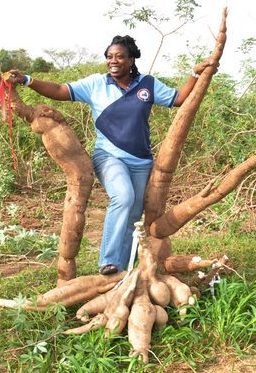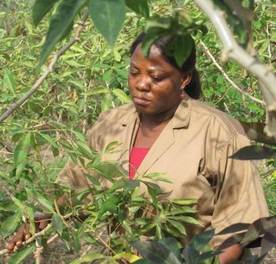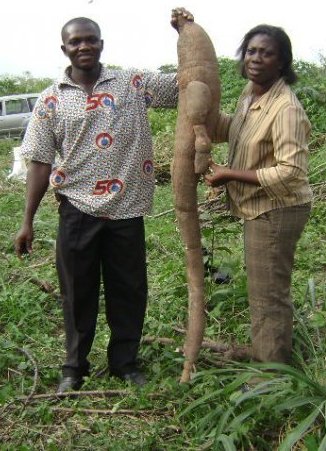Two peas in a pod, hand in hand,
“In the past, the assumption was always that ‘Africa can’t do this.’ Now, people see that when given a chance to get round circumstances – as GCP has done for us through the provision of resources, motivation, encouragement and training – Africa can achieve so much!…GCP has made us visible and attractive to others; we are now setting the pace and doing science in a more refined and effective manner…Building human capacity is my greatest joy….I’ve pushed to make people recognise that women can do advanced agricultural science, and do it well. To see a talented woman researcher firmly established in her career and with her kids around her is thrilling….Rural families are held together by women, so if you are able to change their lot, you can make a real mark…” – Elizabeth Parkes, cassava researcher, Ghana
Elizabeth’s PhD is on cassava genetic diversity, combining ability, stability and farmer preference in Ghana. But for Elizabeth, it is not the academic laurels and limelight but rather, a broader vision of social justice which really drives her: “I see African communities where poverty and hunger are seemingly huge problems with no way out; I’m fortunate to be working on a crop whereby, if I put in enough effort, I can bring some solutions. My primary target group in my research is the less privileged, and women in particular have been my friends throughout. Rural families are held together by women, so if you are able to change their lot, you can make a real mark.”
…agricultural research was a man’s job!”

A perennial passion for cassava, and walking with giants: Elizabeth with the pick of the crop for the 2014 cassava harvest season at IITA, Ibadan, Nigeria.
Prowess and prejudice: Breaking the mould and pioneering into pastures new
On first tentatively dipping her toe into the professional waters of crop science when growing up in her native Ghana, initial reactions from her nearest and dearest suggested that carving out a name for herself in her career of choice was never going to be a walk in the park: “As an only girl among eight boys of whom three were half-siblings, and the youngest child, my father was not very amused; he thought agricultural research was a man’s job!” she recalls. Undeterred and ever more determined to turn this commonly held canard on its head, Elizabeth went on to bag a Bachelor’s degree in Agriculture, a diploma in Education, and an MPhil degree in Crop Science. During a stint of national service between academic degrees, she approached a scientist engaged in root and tuber projects at Ghana’s Council for Scientific and Industrial Research (CSIR) Crops Research Institute (CRI), offering to carry out some research on cassava, and soon establishing the institute’s first trials in Techiman, in the Brong Ahafo Region,where she was doing her national service. Recognising all the hallmarks of a great scientist, nurturer and leader, her CRI colleagues were quick to welcome this fresh talent into the fold as an Assistant Research Officer, with the full treasure trove of root tuber crops – from cassava to sweet potato to yam and cocoyam, among others – all falling under her remit. Not a bad start for the first woman to be assigned to the project!
Quickly proving herself as a fiercely cerebral researcher with a natural knack for the plant sciences, Elizabeth was encouraged by seasoned (then) GCP scientist, Martin Fregene (their paths had crossed during Elizabeth’s master’s degree thanks to research collaboration with the International Institute of Tropical Agriculture – IITA), to embark on a PhD degree with a focus on cassava. Coinciding with an era when links between Martin’s then home institute, the International Center for Tropical Agriculture (CIAT) and GCP were beginning to really take off the ground, it was a move that proved timely, and a path which Elizabeth pursued with her characteristic vigour and aplomb, climbing the GCP research ranks from multiple travel-grant recipient to a research fellow, and, more recently, to Lead Researcher for GCP’s cassava work in Ghana. Now a well established cassava connoisseur who regularly rubs shoulders with the crème de la crème of the global crop science community, Elizabeth specialises in drought tolerance and disease resistance in the GCP-related aspects of her work, whilst also turning her hand to biofortification research for GCP sister CGIAR Challenge Programme, HarvestPlus.
… it [biotechnology] was a breakthrough which Elizabeth spearheaded…”
Up, up and away! How a helping hand has led Elizabeth & Co to new professional and research heights
Life aboard the GCP ship, Elizabeth reveals, has offered a wealth of professional opportunities, both on personal and institutional levels. GCP-funded infrastructure, such as weather stations and irrigation systems, has helped to boost yields and enhance the efficiency of CRI trials, she observes. Professional development for herself and her team, she says, has been multifold: “Through our GCP work, we were able to build a lab and kick-start marker-assisted breeding – that ignited the beginning of biotechnology activities in CRI,” Elizabeth asserts. It was a breakthrough which Elizabeth spearheaded, and which, happily, has since become run-of-the mill practice for the institute: “Now CRI scientists are regularly using molecular tools to do their work and are making cassava crosses on their own.” The positive domino effect of this change in tide cannot be underestimated: “Our once small biotechnology laboratory has evolved into a Centre of Excellence under the West Africa Agricultural Productivity Programme. Its first-class facilities, training courses and guiding hand in finding solutions have attracted countless visiting scientists, both from Ghana and internationally – this means that the subregion is also benefitting enormously.” The GCP’s Genotyping Support Service (GSS), Elizabeth affirms, has also proved an invaluable sidekick to these developments: “Through the GSS, our team learnt how to extract DNA as a first step, and later to re-enact all the activities that were initially done for us externally – data sequencing, interpretation and analysis for example – on a smaller scale in our own lab.” The collection and crunching of data has also become a breeze: “Thanks to GCP’s support, we have become a pace-setter for electronic data gathering using tablets, field notebooks and hand-held devices,” she adds.
….GCP gives you the keys to solving your own problems, and puts structures in place so that knowledge learnt abroad can be transferred and applied at home – it’s been an amazing journey!”

Ruth Prempeh, one of Elizabeth’s charges, collecting data for her GCP-funded PhD on cassava post-harvest physiological deterioration. Ruth is one of those whose work–family balance Elizabeth celebrates. Ruth has since submitted her thesis awaiting results. As you’ll hear in the podcast below, both of Ruth’s young children have each, er, sort of ‘attended’ two big GCP events!
People power: capacity building and work–life balance
Elizabeth lights up most when waxing lyrical about the leaps and bounds made by her many students and charges through the years, who – in reaping some of the benefits offered by GCP, such as access to improved genetic materials; forging links with like-minded colleagues near and far, and, critically, capacity building – have gone on to become established and often internationally recognised breeders or researchers, with the impacts of their work posting visible scores in the fight against global food insecurity. On the primordial role of capacity building, she says: “GCP gives you the keys to solving your own problems, and puts structures in place so that knowledge learnt abroad can be transferred and applied at home – it’s been an amazing journey!” Of her female students who’ve surmounted the work–family pendulum challenge, she says: “I’ve pushed to make people recognise that women can do advanced agricultural science, and do it well. To see a talented woman researcher firmly established in her career and with her kids around her is thrilling.”
At IITA, Elizabeth continues to be an inspiration on work–life balance for women working on their PhDs, and more so for young women whose work is on cassava. In a male-dominated environment (global statistics report that women researchers are a meagre 30 percent), this inspiration is critical. .
No ‘I’ in team: tight-knit community a must for kick-starting real and sustainable solutions
As Elizabeth well knows, one swallow does not a summer make: as demonstrated by the GCP’s Communities of Practice (CoPs), she says, strength really does come in numbers: “The GCP Cassava CoP has brought unity amongst cassava breeders worldwide; it’s about really understanding and tackling cassava challenges together, and bringing solutions home.” Bolstering this unified spirit, Elizabeth continues, is the GCP’s Integrated Breeding Platform (IBP): “With the initial teething problems mainly behind us, IBP is now creating a global community and is an excellent way of managing limited resources, reducing duplication of efforts and allowing people to be more focused.” On helping scientists inundated with information to spot the wood from the trees, she says: “Over the years, lots of data have been generated, but you couldn’t find them! Now, thanks to IBP, you have sequencing information that you can tap into and utilise as and where you need to. It’s very laudable achievement!”
In the past, the assumption was always that ‘Africa can’t do this.’…GCP has made us visible and attractive to others; we are now setting the pace and doing science in a more refined and effective manner.”

Clearly, keeping the company of giants is not new for Elizabeth (right). This giant cassava tuber is from a 2010 CRI trial crossing improved CIAT material with CRI landraces (traditional farmer varieties. The trial was part of Bright Boakye Peprah’s postgraduate work. Bright has since completed his GCP-funded master’s degree on cassava breeding, and now a full time cassava breeder with CSIR–CRI. He is currently on study leave pursuing a PhD on cassava biofortification in South Africa. On the left is Joseph Adjebeng-Danquah, a GCP-funded PhD student whose work centres on cassava drought tolerance. Our best quote from Joseph: “It is important to move away from the all too common notion that cassava is an ‘anywhere, anyhow’ crop.”
Empowered and engaged: African cassava researchers reclaim the driving seat
The bedrock of GCP’s approach, Elizabeth suggests, is the facilitation of that magical much sought-after Holy Grail: self-empowerment. “When I first joined GCP,” she recalls, “I saw myself as somebody from a country programme being given a place at the table; my inputs were recognised and what I said would carry weight in decision-making.” It’s a switch she has seen gain traction at national and indeed regional levels: “In the past, the assumption was always that ‘Africa can’t do this.’ Now, people see that when given a chance to get round circumstances – as GCP has done for us through the provision of resources, motivation, encouragement and training – Africa can achieve so much!” Reflecting on the knock-on effect for African cassava researchers particularly, she concludes: “GCP has made us visible and attractive to others; we are now setting the pace and doing science in a more refined and effective manner.”
Paying it forward and sharing: Helping women, and thereby, communities
Armed with bundles of knowledge as she is, Elizabeth is a firm believer in paying it forward and sharing: “Building human capacity is my greatest joy,” she affirms, citing farmers, breeders, and a Ghanaian private-sector company as just a few of the fortunate beneficiaries of her expertise over recent years. And on sources of motivation, it is not the academic laurels or limelight but rather a broader vision of social justice which really drives her: “I see African communities where poverty and hunger are seemingly huge problems with no way out; I’m fortunate to be working on a crop whereby, if I put in enough effort, I can bring some solutions.” They are solutions which she hopes will be of lasting service to those closest to her heart: “My primary target group in my research is the less privileged, and women in particular have been my friends throughout. Rural families are held together by women, so if you are able to change their lot, you can make a real mark.”
We’re in a blessed and privileged era where cassava, an ancient and once orphan crop, is now receiving lots of attention… I encourage young scientists to come on board!”
Inspired, and inspiring: nurturing budding cassava converts, and seizing opportunities for impact
In terms of future horizons, Elizabeth – who after more than two decades of service at CRI is currently on leave of absence at IITA where she’s working on biofortification of cassava – hopes to thereby further advance her work on cassava biofortification, and perhaps later move into a management role, focusing on decision-making and leading agricultural research leaders with monitoring and evaluation specifically to “ensure that the right people are being equipped with skills and knowledge, and that those people are in turn teaching others.” She is also confident that any young, gifted researcher with an eye on the prize would be foolhardy to overlook what Elizabeth views as a golden opportunity for creating meaningful and lasting impacts: “We’re in a blessed and privileged era where cassava, an ancient and once orphan crop, is now receiving lots of attention. Every agricultural research lead we have in Africa is there to be seized – I encourage young scientists to come on board!” A clear and convincing clarion call to budding breeders or potential cassava converts if ever there was one…. who wants in, in this love-match where cassava and capacity building are truly two peas in a pod?
Like meets like in a fair match: Our cassava champion in a male-dominated environment, Elizabeth, meets her match in Farmer Beatrice who refused to take no for an answer, and beat Elizabeth hands down. Listen to this!
Links
- BLOGPOST: Cassava on the catwalk: Ghanaian ‘make-over’ for crop-science underdog
- GCP-supported postgraduate students working on cassava
- PODCAST (4 minutes) Elizabeth touches on why gender matters in agriculture; status of women scientists and women farmers; and on why cassava should be the crop of choice for young scientists. Alternatively, tune in directly to any of these topics in the mini-podcasts below:
- Cassava Research Initiative
- Cassava InfoCentre
- GCP capacity building
- Integrated Breeding Platform
- Data on women in science








